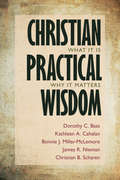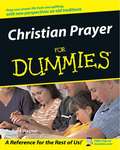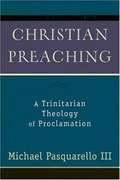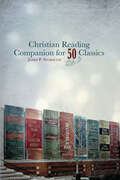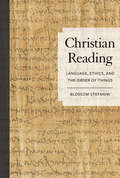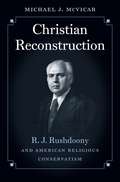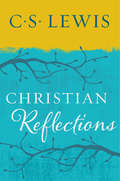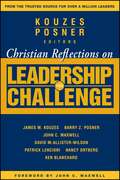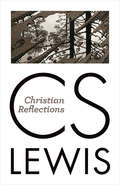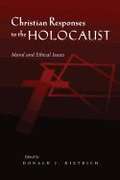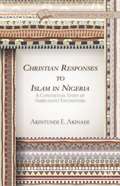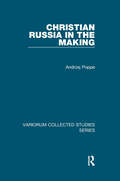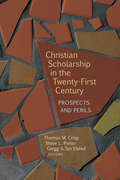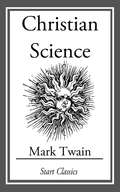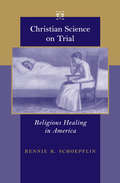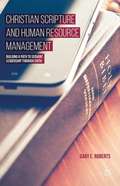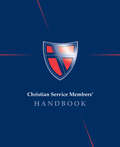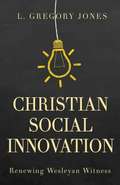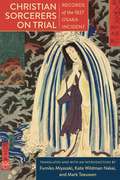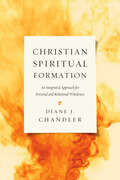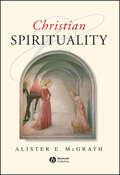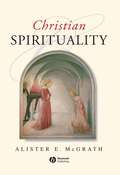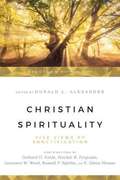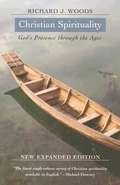- Table View
- List View
Christian Practical Wisdom: What It Is, Why It Matters
by Dorothy C. Bass Kathleen A. Cahalan Christian B. Scharen James R. Nieman Bonnie J. Miller-McLemoreIn this richly collaborative work, five distinguished scholars examine the oft-neglected embodied practical wisdom that is essential for true theological understanding and faithful Christian living. After first showing what Christian practical wisdom is and does in several real-life situations, the authors tell why such practical wisdom matters and how it operates, exploring reasons behind its decline in both the academy and the church and setting forth constructive cases for its renewal.
Christian Prayer For Dummies
by Richard WagnerAdvice and examples help you find your own prayer styleDiscover how prayer works and why you need it now more than everDo you want to pray, but you're not sure how? This friendly guide explains the different kinds of prayer - revealing how and why to pray and how to discern God's answers. You'll see how to overcome hindrances, how to use a journal, and how to pray on your own. Discover what "Thy will be done" means and how to approach prayers that seemingly haven't been answered.The Dummies Way* Explanations in plain English* "Get in, get out" information* Icons and other navigational aids* Tear-out cheat sheet* Top ten lists* A dash of humor and fun
Christian Preaching
by Michael Pasquarello IIIPracticing pastors, lay preachers, and those who are studying for formal ministry, will find much inspiration and instruction in this book.
Christian Reading Companion for 50 Classics
by James P. StobaughReading and understanding the classics is important for college preparation, as well as for personal enjoyment. With the Christian Reading Companion for 50 Classics you can gain a deeper understanding of them from a Christian perspective. Selections include books and plays for both middle school and high school levels. Whether supplementing an existing curriculum or doing a special survey course on classic literature, this is a challenging guide which presents: Short descriptions of each title Objective and discussion questions to stir thought Quotations that give insights into character, plot, and more. The student chapters are in the first part of the volume, and the teacher's answer keys are available in the back section. The objective test portions are found in each chapter and also offered as a free download for classroom use at nlpg.com/50classicsaids. This guided analysis is also a helpful introduction to the discussions found in Dr. Stobaugh's American, British, and World Literature curriculum. Get even more out of your literary experiences with a glossary, brief author biographies, and age-appropriate suggestions for your student. A detailed answer guide helps you turn a love of reading into a credited, educational course that will encourage an appreciation of the written word, develop vocabulary skills, and prompt a deeper interaction with books that are foundational for college-prep activities!
Christian Reading: Language, Ethics, and the Order of Things
by Blossom StefaniwChristian Reading shifts the assumption that study of the Bible must be about the content of the Bible or aimed at confessional projects of religious instruction. Blossom Stefaniw focuses on the lesson transcripts from the Tura papyri, which reveal verbatim oral classroom discourse, to show how biblical texts were used as an exhibition space for the traditional canon of general knowledge about the world. Stefaniw demonstrates that the work of Didymus the Blind in the lessons reflected in the Tura papyri was similar to that of other grammarians in late antiquity: articulating the students’ place in time, their position in the world, and their connection to their heritage. But whereas other grammarians used revered texts like Homer and Menander, Didymus curated the cultural patrimony using biblical texts: namely, the Psalms and Ecclesiastes. By examining this routine epistemological and pedagogical work carried out through the Bible, Christian Reading generates a new model of the relationship of Christian scholarship to the pagan past.
Christian Reconstruction
by Michael Joseph McvicarThis is the first critical history of Christian Reconstruction and its founder and champion, theologian and activist Rousas John Rushdoony (1916-2001). Drawing on exclusive access to Rushdoony's personal papers and extensive correspondence, Michael J. McVicar demonstrates the considerable role Reconstructionism played in the development of the radical Christian Right and an American theocratic agenda. As a religious movement, Reconstructionism aims at nothing less than "reconstructing" individuals through a form of Christian governance that, if implemented in the lives of U.S. citizens, would fundamentally alter the shape of American society.McVicar examines Rushdoony's career and traces Reconstructionism as it grew from a grassroots, populist movement in the 1960s to its height of popularity in the 1970s and 1980s. He reveals the movement's galvanizing role in the development of political conspiracy theories and survivalism, libertarianism and antistatism, and educational reform and homeschooling. The book demonstrates how these issues have retained and in many cases gained potency for conservative Christians to the present day, despite the decline of the movement itself beginning in the 1990s. McVicar contends that Christian Reconstruction has contributed significantly to how certain forms of religiosity have become central, and now familiar, aspects of an often controversial conservative revolution in America.
Christian Reflections
by C. S. LewisIn Christian Reflections C.S. Lewis brings his vast and original intellect to bear on a wealth of subjects, including ethics, historicism, Christianity and culture. This selection of essays and papers, drawn from all stages of his career, presents Lewis at his most varied and profound.
Christian Reflections on the Leadership Challenge
by James M. Kouzes Barry Z. Posner John C. MaxwellChristian Reflections on The Leadership Challenge is a faith-based companion to the best-selling leadership book of all time--The Leadership Challenge Grounded in Jim and Barry's time-tested research, Christian Reflections on The Leadership Challenge describes their Five Practices of Exemplary Leadership ® --Model the Way, Inspire a Shared Vision, Challenge the Process, Enable Others to Act, and Encourage the Heart -- and offers practical guidance and inspiring examples about how Christian leaders can have a powerful impact in their workplaces, communities, and congregations by bringing their faith into their leadership. In addition to Jim and Barry?s foundational wisdom, the book brings together five leaders who reflect on the Five Practices from a Christian perspective John C. Maxwell, David McAllister-Wilson, Patrick Lencioni, Nancy Ortberg, and Ken Blanchard share insights and stories culled from personal experience and the lives of other Christian leaders who have accomplished extraordinary things in churches, communities, classrooms, and corporations Their thoughtful reflections on the role of faith in leadership will propel leaders and aspiring leaders
Christian Reflections: Centenary Edition
by C. S. LewisShortly after his conversion in 1929, C. S. Lewis wrote to a friend, "When all is said (and truly said) about the divisions of Christendom, there remains, by God's mercy, an enormous common ground." From that time on, Lewis thought that the best service he could provide for his unbelieving neighbors was to explain and defend the faith that has been shared by nearly all Christians at all times.Christian Reflections contains fourteen of Lewis's papers defending Christianity. They are colorfully varied, covering such topics as Christianity and literature, ethics, futility, church music, the Psalms, and petitionary prayer. Common to them all, however, are the uniquely effective style of C. S. Lewis and the basic presuppositions of his theology -- his "mere" Christianity.
Christian Responses To The Holocaust
by Donald J. DietrichThese essays focus on the Christian responses to Nazism and delineate the roles that individuals and their churches played in confronting Hitler.
Christian Responses to Islam in Nigeria
by Akintunde E. AkinadeThis book examines the various Christian responses to Islam in Nigeria. It is a study of the complex, interreligious relationships in Nigeria. Using a polymethodic approach, the book grapples with many narratives dealing with interreligious competition and cooperation in Nigeria.
Christian Russia in the Making (Variorum Collected Studies #867)
by Andrzej PoppeThe present collection of studies by Andrzej Poppe in many ways represents a continuation of the research brought together a quarter century ago in the author's previous Variorum volume. The focal themes are the political circumstances of the 'baptism of Russia' and the processes by which Rus' became a Christian country, an era marked by the emergence of indigenous saints in royal and monastic garb. Relations with the Byzantine world, both political and ecclesiastical, are often to the fore, but as Poppe shows, those with the West, from the Carolingians onwards, were important too. Many of the articles are provided with additional notes, and the volume includes three pieces previously unpublished in English, including an introductory survey of the Rurikid dynasty, and a major new study of the process by which Vladimir the Great became a saint.
Christian Scholarship in the Twenty-First Century: Prospects and Perils
by Thomas M. Crisp Steve L. Porter Gregg Ten ElshofThe Christian tradition provides a wealth of insight into perennial human questions about the shape of the good life, human happiness, virtue, justice, wealth and poverty, spiritual growth, and much else besides -- and Christian scholars can do great good by bringing that rich tradition into conversation with the broader culture. But what is the nature and purpose of distinctively Christian scholarship, and what does that imply for the life and calling of the Christian scholar? What is it about Christian scholarship that makes it Christian? Ten eminent scholars grapple with such questions in this volume. They offer deep and thought-provoking discussions of the habits and commitments of the Christian scholar, the methodology and pedagogy of Christian scholarship, the role of the Holy Spirit in education, Christian approaches to art and literature, and more. CONTRIBUTORS Jonathan A. Anderson Dariusz M. Brycko Natasha Duquette M. Elizabeth Lewis Hall George Hunsinger Paul K. Moser Alvin Plantinga Craig J. Slane Nicholas Wolterstorff Amos Yong
Christian Science
by Mark TwainChristian Science is Mark Twain's razor-sharp attack on a popular movement which was sweeping the country at the turn of the 20th century. One of the tenets of Christian Science is the healing of physical illness through prayer. Having recently lost a daughter to meningitis, Twain responded angrily to the notion that pain and sickness were easily surmounted. His deep-seated iconoclasm also caused him to take aim at Mary Baker Eddy, the founder of Christian Science, who he saw as self-promoting and fraudulent. Using all of the satire and wit for which he is famous, Twain pokes fun at a movement he feared would become a powerful force in the country.
Christian Science on Trial: Religious Healing in America (Medicine, Science, and Religion in Historical Context)
by Rennie B. SchoepflinIn Christian Science on Trial, historian Rennie B. Schoepflin shows how Christian Science healing became a viable alternative to medicine at the end of the nineteenth century. Christian Scientists did not simply evangelize for their religious beliefs; they engaged in a healing business that offered a therapeutic alternative to many patients for whom medicine had proven unsatisfactory. Tracing the evolution of Christian Science during the late nineteenth and early twentieth centuries, Christian Science on Trial illuminates the movement's struggle for existence against the efforts of organized American medicine to curtail its activities.Physicians exhibited an anxiety and tenacity to trivialize and control Christian Scientists which indicates a lack of confidence among the turn-of-the-century medical profession about who controlled American health care. The limited authority of the medical community becomes even clearer through Schoepflin's examination of the pitched battles fought by physicians and Christian Scientists in America's courtrooms and legislative halls over the legality of Christian Science healing. While the issues of medical licensing, the meaning of medical practice, and the supposed right of Americans to therapeutic choice dominated early debates, later confrontations saw the legal issues shift to matters of contagious disease, public safety, and children's rights. Throughout, Christian Scientists revealed their ambiguous status as medical practitioners and religious healers. The 1920s witnessed an unsteady truce between American medicine and Christian Science. The ambivalence of many Americans about the practice of religious healing persisted, however. In Christian Science on Trial we gain a helpful historical context for understanding late–twentieth-century public debates over children's rights, parental responsibility, and the authority of modern medicine.
Christian Scripture And Human Resource Management
by Gary E. RobertsChristian Scripture and Human Resource Management provides a much-needed Christian faith-based perspective on human resources management written for both line and human resource managers using the framework of servant leadership, the mandated leadership approach used by Jesus.
Christian Service Members Handbook
by WELS Special MinistriesAre you a Christian serving in the military? This pocket-sized faith-and-worship book was written and designed to help you take God's Word with you wherever you're sent. Christian Service Members' Handbook contains: • Prayers for specific military topics and the church season • Morning and evening devotion orders • Selections of Scripture • Hymns • Portions of Luther's Small Catechism This book was developed to help you and other believers serving in the military stay strong in your faith while in battle or in dangerous situations where a pastor or fellow believer might not be available.
Christian Social Innovation: Renewing Wesleyan Witness
by L. Gregory JonesEverybody seems interested in innovation and entrepreneurship these days. Start-ups are generating new jobs, creating wealth and providing solutions to longstanding problems. People are also aware that old-line social institutions need innovative approaches that provide renewal, re-establish trust and cultivate sustainability.What do faith communities have to do with innovation and entrepreneurship? Faith communities have their own need for innovation, demonstrated in a growing interest in starting new churches, developing "fresh expressions" for gatherings of community and discussions about how to cultivate a renewed sense of mission.But do faith communities have anything unique to contribute to conversations about innovation and entrepreneurship, especially in "social entrepreneurship"? At first glance, the answer seems to be "no." Burgeoning literature on social entrepreneurship barely mentions the church or other faith-based institutions — and when it does they’re often described as part of the broken institutional landscape.Recently much of the most innovative and entrepreneurial work in these sectors has been done apart from faith communities, whether through secular non-governmental organizations (e.g., Teach for America, Knowledge is Power Program schools) or for-profit businesses (e.g., hospitals and hospices). Indeed, it is now often assumed that faith and faith communities either are irrelevant to social innovation and entrepreneurship or are a significant obstacle.We believe too many people in faith communities, and faith-based organizations themselves, turned inward. They became preoccupied with managing what already existed rather than focusing on innovative renewal of their organizations and entrepreneurial approaches to starting new ones. However, Christian social innovation, at its best, depends on a conception of hope different than the optimism that often characterizes secular endeavors, a hope that acknowledges personal and social brokenness. Further, faith communities, at their best, have embodied perseverance, often bringing people together across generations and diverse sectors to imagine how common effort and faith might overcome obstacles.Although some faith communities have lost the "at-their-best" focus, new conversations and experiments are emerging beyond the goal of starting new congregations. But they tend to be "and" conversations: faith and innovation, faith and entrepreneurship, faith and leadership. We don’t think this goes deep enough. Faith might truly "animate" social innovation and entrepreneurship. In this perspective, faith is not held at a distance from the activities of life but is instead its vital force, providing the imagination, passion and commitment that lead to transformation.
Christian Sorcerers on Trial: Records of the 1827 Osaka Incident
by Kate Wildman Nakai Fumiko Miyazaki Mark TeeuwenIn 1829, three women and three men were paraded through Osaka and crucified. Placards set up at the execution ground proclaimed their crime: they were devotees of the “pernicious creed” of Christianity. Middle-aged widows, the women made a living as mediums, healers, and fortune-tellers. Two of the men dabbled in divination; the third was a doctor who collected books in Chinese on Western learning and Christianity.This was a startling development. No one in Japan had been identified and punished as a Christian for more than a century, and now, avowed devotees of the proscribed sect had appeared in the very heart of the realm. Just decades before the arrival of Perry’s black ships and the fall of the Tokugawa shogunate, the incident reignited fears of Christians as evil sorcerers, plotting to undermine society and overthrow the country.Christian Sorcerers on Trial offers annotated translations of a range of sources on this sensational event, from the 1827 arrest of the alleged Christians through the case’s afterlife. The protagonists’ testimonies relate with striking detail their life histories, practices, and motivations. The record of deliberations in Edo and communications between Osaka and Edo officials illuminate the operation of the Tokugawa system of criminal justice. Retellings of the incident show how the story was transmitted and received. Translated and put in context by Fumiko Miyazaki, Kate Wildman Nakai, and Mark Teeuwen, the sources provide students and scholars alike with an extraordinarily rich picture of late Edo social life, religious practices, and judicial procedures.
Christian Spiritual Formation: An Integrated Approach for Personal and Relational Wholeness
by Diane J. ChandlerThis comprehensive theory and practice of Christian spiritual formation weaves together biblical and theological foundations with interdisciplinary scholarship, real-world examples, personal vignettes, and practical tools to assist readers in becoming whole persons in relationship with God and others.
Christian Spirituality: An Introduction
by Alister E. McGrathThis text fills the need for a clear, informative, helpful and well-written introduction to Christian spirituality. Includes a detailed guide to resources in spirituality available on the Internet Written by a leading theological educationalist in a clear and accessible manner Encourages active engagement with primary sources through worked case studies
Christian Spirituality: An Introduction
by Alister E. McgrathThis book aims to equip you to engage with the great spiritual riches of the Christian tradition, and it does so by introducing you to some of the great themes and texts of that tradition and encouraging and enabling you to engage with it
Christian Spirituality: Five Views of Sanctification
by Donald AlexanderThe nature of Christian spirituality has been widely debated throughout the history of the church. The doctrine of sanctification was one of the main fissures separating Luther from the Catholic Church. Even today different groups of Protestants disagree on how we draw closer to God. What distinguishes the different poisitions and what exactly is at stake in these recurring debates.
Christian Spirituality: God's Presence through the Ages
by Richard J. WoodsA brief and non-technical account of the development of Christian Spirituality in its social and historical context.
